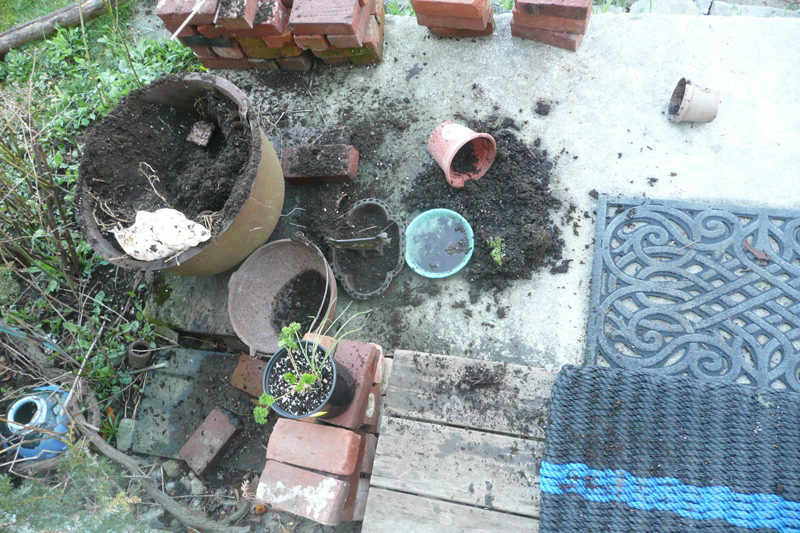
The aftermath of a raccoon’s fun (Photo courtesy Nancy Holmes)
The only animal who would accomplish such a mess on my front doorstep is a raccoon. I suppose he was after earthworms or other tasty invertebrate dainties. Knowing ‘coons, I wonder if it was just a lot of fun to dig in soft dirt and turn over plant pots.
When, I worked for the Natural History Survey in Illinois, one of my happiest tasks one spring, was raising baby ‘coons. They suck so eagerly on a doll baby bottle that they are likely to inhale milk and die of pneumonia. It was a challenge to keep them from drowning themselves, but it was so cute as they clutched the bottle in their tiny, hand-like paws. When they were weaned and galloping, rough-housing around in their cage – and my apartment – they went back to the university to grow up.
In the wild, they would be born in a tree cavity or ground den, after a gestation period of around two months. They venture out from the den at about seven weeks, and soon they forage with their “sow,” as she is called.
One fall, I watched three adolescent “kits” harvesting wild cherries, as Mom, no doubt, watched from nearby. They must have been about three months old, and the size of a large cat.
They were very capable tree climbers. They could hang from a limb by their hind feet, using their hands to pull up a twig loaded with fruit. They are one of few mammals that can twist their back legs around to climb down head-first. I tried to teach that to my cat, but cat feet don’t bend that way, and cats detest going down a tree tail first. They can learn, but they would rather jump down the last 6 or 8 feet. Thump! Then they march away, scowling and switching their tails.
‘Coon kits spend their first winter with the sow. In spring, they are not welcome as she produces the next litter, and they can forage on their own. Female kits become mothers as yearlings, though “boars” don’t mature until the following spring.
‘Coons are susceptible to distemper and rabies; and, at least in Illinois, a nematode that is dangerous to humans can be transmitted through their droppings. And, they bite! I have a scar from a former pet donated to the Illinois Natural History Survey. He watched calmly as I opened his pen door and reached for his food dish. Then he dove, teeth first, from his nest box onto my hand.
My children illegally rescued a kit whose mother was dead on the road. As he grew, he took human control as a declaration of war. He had the ‘coon passion for playing in water – in the sink; and the best we could do was use a flyswatter to stop him from climbing up between the back of the stove and the wall, to paddle in a greasy frying pan.
My kids and I wished him luck as we released him into a somewhat remote, marshy, pond. We knew he would need a lot of luck. So just don’t try to keep the irresistibly cute babies. Leave them alone to wait for their mother to come for them. She would be frantic if she returned to where she left her kits, and they were gone.
If they are still alone the next day, or if you see that the mother is dead, call the Maine Warden Service at 1-800-452-4664 to get them to a wildlife rehabilitator. It’s certainly cruel to expect a young wild animal to survive without its mother. And it is risky and heartbreaking for the adopters.
A four-footed neighbor I don’t appreciate is the cat who I wish would get an indoor life. She sinks down in the long grass near my feeders, and I find sad little piles of feathers. Yes, they do love to be outside. And they do kill birds even if you don’t have a bird feeder. It’s estimated that more than a billion birds are killed by cats in the U.S. every year.
Where are the orioles? A few passed through, but none here now.
The male robin named Putin is still, after weeks, fighting the robin he thinks he sees in his reflections in my windows. I haven’t been able to see if he has a mate, or if he is completely possessed by territorial passion.
(Nancy Holmes prowled Linekin Neck in Boothbay as a child, then an Illinois bottomland while earning a master’s degree in wildlife management. Once back in Maine, she raised children and kept assorted animals, wild and domestic. She and her Carolina dog roam their woods in Newcastle. Write to Holmes at castlerock@tidewater.net.)



